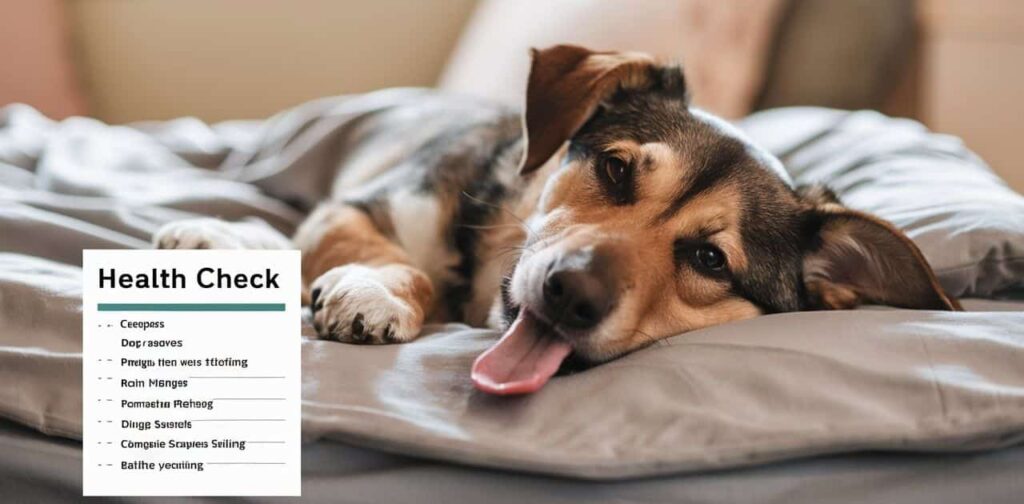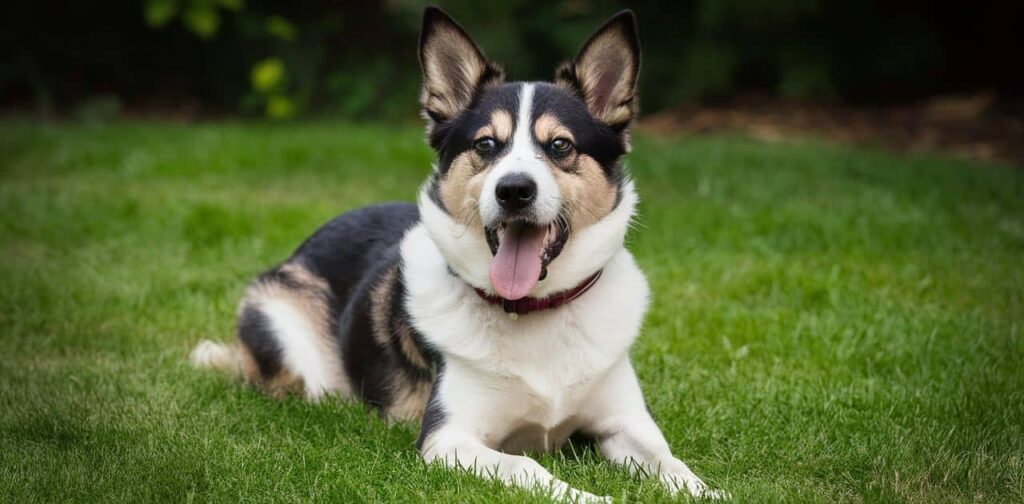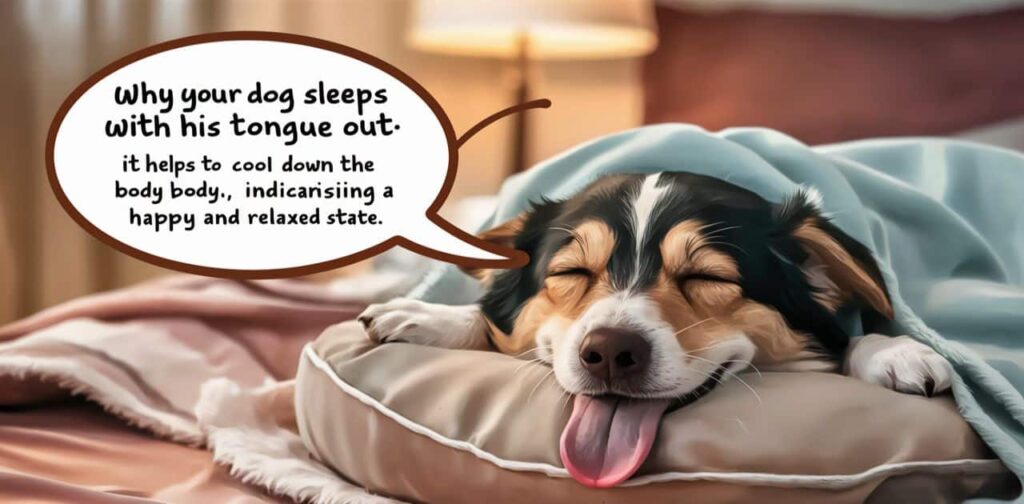Ever caught your furry friend snoozing with their tongue peeking out? It’s not just adorable it’s fascinating! Dogs sleeping with their tongues out is a common sight that often makes us chuckle. But there’s more to this quirky habit than meets the eye.
In this blog post, we’ll explore five surprising reasons behind this endearing behavior. From keeping cool to showing ultimate relaxation, your pup’s tongue-out naps reveal a lot about their comfort and health.
So, why does your dog sleep with their tongue out? Let’s dive into the unexpected explanations that’ll make you see this cute quirk in a whole new light!
Why Your Dog Sleeps with His Tongue Out?
Puppies are regarded for their adorable quirky behaviors and one of the most endearing is napping with their tongue out. It is a commonplace sight to see a canine dozing away with their tongue lolling out and it is now not simply because they may be comfy and at ease. In reality there are numerous reasons why dogs might also sleep with their tongue out a number of which may marvel you.
From dental issues to heat law this may discover the viable reasons at the back of this lovable canine addiction. So if you have ever puzzled why your hairy pal sleeps with their tongue out study directly to find out the charming motives behind this conduct.
The Canine Cooling System: Temperature Regulation
Dogs aren’t blessed with the ability to sweat it out like we do when the heat’s cranked up. Instead, they’ve got a built-in air conditioning system that’s as clever as it is cute. When your puppy’s tongue hangs out during a nap, it might just be their body’s way of keeping cool.
Nature’s Thermostat: How Dogs Beat the Heat
Unlike humans who can sweat from nearly every pore dogs only have sweat glands in their paw pads. Talk about getting the short end of the stick. So they do manage when the mercury rises. They pant of course. By hanging their tongue out, dogs increase the surface area exposed to air which helps evaporate moisture and cool them down.
Fun Fact: A dog’s tongue can increase up to 5 times its resting size when fully extended maximizing its cooling potential.
When your dozing pooch leaves their tongue out it might be a lingering effect from a recent cooling session. Think of it as leaving the window open after the AC’s been turned off. It is all about maintaining that perfect doggy temperature.
The Sleeping Position Connection
Your dog’s sleeping position can play a role in whether their tongue makes an appearance. Pups who sprawl out on their backs or sides are more likely to let their tongues hang loose. It is all about relaxation. When they are in these positions their jaw muscles are at their most relaxed making it easier for the tongue to slip out.
Dog Relaxation Station: When Dozing Off Means Dropping Jaws

Sometimes, a tongue-out nap is simply the ultimate sign of relaxation. When dogs enter deep sleep, their muscles relax to a point where keeping the mouth closed becomes optional.
The “I’m So Comfy I Can’t Even” Phenomenon
When you are so comfortable you could melt into the couch. That’s what your dog experiences when they are in a state of deep relaxation. Their jaw muscles loosen up, and voila – out comes the tongue.
Here is a quick breakdown of dog sleep stages:
- Drowsiness: Light sleep, easily awakened
- Light Sleep: Brain waves slow down
- Deep Sleep: Muscles relax, breathing slows
- Rapid eye: Movement, possible dreaming (and tongue appearances!)
Why Some Dogs Are More ‘Tongue-y’ Than Others
Not all dogs are equally prone to sleeping with their tongues out. Factors like jaw structure facial muscle tone and even personality can play a role. Breeds with shorter snouts or more relaxed jowls might be more likely to give you a tongue show during naptime.
Breed-Specific Quirks: When Your Dog’s Face Plays a Role
Your dog’s genetic makeup might influence their sleeping habits. Brachycephalic breeds those adorable flat-faced pups are often the poster children for tongue-out sleeping.
Brachycephalic Beauties: The Snub-Nosed Sleep Squad
Breeds like Pugs, Bulldogs and Boxers often sleep with their tongues out due to their unique facial structure. Their shortened snouts can make it challenging to keep their tongues fully contained even when awake!
Table: Common Brachycephalic Breeds and Their Tongue-Out Tendencies
| Breed | Likelihood of Tongue-Out Sleep |
| Pug | Very High |
| French Bulldog | High |
| Boxer | Moderate to High |
| Shih Tzu | Moderate |
| Boston Terrier | Moderate |
Size Matters: Small Dogs and Big Tongues
Smaller breeds like Chihuahuas and Yorkshire Terriers might also be more prone to tongue-out napping. Their tiny mouths sometimes struggle to contain their relatively large tongues, leading to adorable sleep-time tongue slips.
Health Check: When Tongue-Out Sleeping Might Signal Issues

While usually harmless persistent tongue out sleeping can occasionally be a sign of underlying health concerns. As responsible pet parents it is essential to know when to seek veterinary care.
Dental Dilemmas: When Oral Health Affects Sleep
Dental problems can cause discomfort that leads dogs to sleep with their mouths open and tongues out. Issues like tooth decay, gum disease or oral injuries might be the culprit behind this behavior.
Warning Signs to Watch For:
- Bad breath
- Difficulty eating
- Pawing at the mouth
- Excessive drooling
If you notice these symptoms along with frequent tongue-out sleeping it is time for a trip to the doggy dentist!
Neurological Narratives: Brain and Nerve Considerations
In some cases, neurological issues can affect a dog’s ability to keep their tongue in their mouth during sleep. Conditions affecting the nerves that control facial muscles might lead to this behavior.
“Any sudden changes in your dog’s sleeping habits, including persistent tongue protrusion, should be evaluated by a veterinarian to rule out potential neurological concerns.” – Dr. Bark Woofson, Canine Neurologist
Breathing Battles: Respiratory Concerns in Flat-Faced Friends
For our brachycephalic buddies sleeping with the tongue out might be a way to improve airflow. These breeds often struggle with breathing difficulties and an open-mouthed sleeping position can help them get the oxygen they need.
Dreaming Doggos: REM Sleep and Tongue Appearances
Just like humans, dogs experience REM (Rapid Eye Movement) sleep – the stage where dreams occur. During this time you might notice twitching paws soft whimpers and yes tongue appearances.
The Science of Canine Dreams
Research suggests that dogs likely dream about their daily activities. So when you see that tongue peeking out during a particularly active sleep session your pup might be dreaming about chasing squirrels or enjoying a tasty treat!
Interpreting Your Dog’s Sleep Behaviors
We can not ask our dogs about their dreams. Observing their sleep behaviors can give us insight into their well-being. A relaxed, occasionally tongue-out sleeper is likely a happy and healthy pup.
Tips for Better Doggy Dreams:
- Provide a comfortable sleeping area
- Maintain a consistent sleep schedule
- Ensure plenty of exercise during waking hours
- Create a calm environment for rest
The REM Riddle: When Dogs Dream Big and Tongues Slip Out

Dig deeper into the fascinating world of canine REM sleep. During this stage, your dog’s brain activity mimics that of their wakeful state, leading to some pretty interesting sleep behaviors including that adorable tongue slip.
Decoding Doggy Dreams
While we can not ask Fido what he’s dreaming about scientists have made some intriguing discoveries:
- Dogs likely dream about daily activities just like humans.
- The size of the dog may influence dream frequency smaller dogs tend to dream more often.
- Some dogs may act out their dreams a phenomenon called REM sleep behavior disorder.
“In REM sleep, dogs experience temporary muscle paralysis, much like humans. However, sometimes this paralysis is incomplete, leading to twitching, ‘running’ in their sleep, and yes, tongues lolling out!” – Dr. Snooze McPawson, Veterinary Sleep Specialist
The Tongue-Out Tell: What It Might Mean
When you spot your pup’s tongue peeking out during a particularly active sleep session, it could indicate:
- They are in a deep, relaxed state of REM sleep
- They are experiencing a vivid dream
- Their jaw muscles have fully relaxed
Table: Dog Sleep Stages and Tongue Behavior
| Sleep Stage | Typical Duration | Likelihood of Tongue-Out |
| Light Sleep | 10-15 minutes | Low |
| Deep Sleep | 15-20 minutes | Moderate |
| REM Sleep | 2-3 minutes | High |
Breed Breakdown: Who is Most Likely to Sleep Tongue-Out?
While any dog can sport the tongue-out look during slumber, some breeds are more prone to this endearing habit. Let’s break it down:
The Flat-Faced Frequent Flyers
Brachycephalic breeds top the list for tongue-out sleeping. Their unique facial structure often means there is simply not enough room in their mouths for their tongues.
Top 5 Tongue-Out Sleepers:
- Pugs
- French Bulldogs
- Boston Terriers
- Pekingese
- Shih Tzus
The Relaxed Runts: Small Dogs with Big Tongues
Tiny pooches often have disproportionately large tongues, making them prime candidates for tongue-out napping.
- Chihuahuas
- Yorkshire Terriers
- Pomeranians
The Laid-Back Larger Breeds
Do not count out the big dogs! Some larger breeds are known for their relaxed demeanor, which can lead to tongue-out sleeping:
- Golden Retrievers
- Bernese Mountain Dogs
- Newfoundlands
Health Hints: When to Worry About Tongue-Out Sleeping

While usually harmless sometimes excessive tongue-out sleeping can be a red flag. Here is when you might want to consult your vet:
Dental Distress Signals
If your dog’s tongue-out habit is accompanied by these symptoms it might be time for a dental check-up:
- Reluctance to eat hard foods
- Excessive drooling
- Visible tartar buildup
- Swollen or bleeding gums
Respiratory Red Flags
For brachycephalic breeds especially, watch out for:
- Loud snoring or wheezing during sleep
- Difficulty catching breath after mild exercise
- Bluish tinge to gums or tongue
Neurological Notices
If you observe these alongside tongue out sleeping seek veterinary attention:
- Loss of balance
- Confusion or disorientation
- Seizures or tremors
- Changes in behavior or personality
Promoting Peaceful Puppy Sleep
Want to ensure your furry friend gets the best possible rest. Try these tips:
- Create a Cozy Corner: Provide a comfortable bed in a quiet area of your home.
- Consistent Routine: Stick to regular feeding and walking times to regulate their internal clock.
- Pre-Bed Exercise: A good play session or walk before bedtime can help tire them out.
- Temperature Control: Ensure their sleeping area is not too hot or cold.
- Limit Water Before Bed: This can help prevent midnight bathroom breaks.
Capturing the Cuteness: Tips for Snapping the Perfect Sleeping Dog Pic

A dog sleeping with their tongue out is social media gold. Here is how to capture that adorable moment:
- Use natural light when possible
- Get down to your dog’s level for the best angle
- Try burst mode to catch fleeting tongue appearances
- Be patient and quiet – you don’t want to wake the sleeping beauty.
Frequently Asked Questions
Is it normal for my dog to sleep with their tongue out?
Yes, it is usually normal and harmless. It often happens when dogs are deeply relaxed or cooling down. if it’s a new or excessive behavior, it is worth mentioning to your vet.
Do all dog breeds sleep with their tongues out?
While any dog can do this it is more common in brachycephalic (flat-faced) breeds. Pugs, Bulldogs, and other short-snouted dogs are more likely to sleep with their tongues out due to their facial structure.
Could sleeping with the tongue out indicate a health problem?
Sometimes, yes. While often harmless, persistent tongue-out sleeping could signal dental issues, respiratory problems, or neurological concerns. If you are worried consult your veterinarian for a checkup.
Does my dog’s tongue hanging out mean they’re too hot?
It could be a sign of temperature regulation. Dogs cool down by panting and sometimes the tongue remains out during sleep. Ensure your dog has a cool, comfortable sleeping area especially in warm weather.
Why does my dog’s tongue only stick out during deep sleep?
During deep sleep, a dog’s muscles relax completely. This includes jaw muscles, which can cause the tongue to slip out. It’s often a sign your pup is super relaxed and comfortable.
Can dreaming cause my dog to sleep with their tongue out?
Dogs experience REM sleep just like humans. During this dream state muscle relaxation and small movements can occur. This might include the tongue slipping out of a slightly open mouth.
Conclusion: Embracing the Tongue-Out Charm
In most cases a dog sleeping with their tongue out is nothing to worry about it is just another endearing quirk that makes our canine companions so lovable. From temperature regulation to deep relaxation there are many reasons why your pooch might let their tongue hang loose during naptime.
Remember every dog is unique and what’s normal for one might not be for another. If you are ever concerned about your dog’s sleeping habits, don’t hesitate to consult with your veterinarian. They can provide personalized advice and ensure your furry friend is as healthy as they are adorable.
So the next time you catch your pup in a tongue out snooze snap a picture share a laugh and appreciate the simple joys of life with a dog. After all there is nothing quite like the sight of a contented canine lost in dreamland tongue and all!







